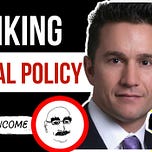We’ve been hearing about the end of globalization for the better part of the last decade, and yet rumors of its demise appear to have been greatly exaggerated. The latest calls for American energy independence and re-shoring manufacturing are part of this broader trend, which seeks to insulate the domestic economy from turmoil in faraway regions. COVID-19 also brought the idea of “industrial policy” back to the forefront. While it’s hard to pin down an exact definition, Scott Lincicome of the Cato Institute relates some key features behind the misguided notion that the government must steer critical industries for reasons of national importance.
Whether we’re talking about steel, oil, or semi-conductors, the proponents of a robust industrial policy argue that we’ve become too reliant on our potential foes for strategic resources, and must set national production goals through legislation rather than impartial market forces. This can range from Soviet-style central planning (which led to the ultimate collapse of the USSR), to the use of trade barriers, tax incentives and subsidies - i.e., “picking winners and losers.”
Even with the latter approach, Lincicome points out many flaws in modern American industrial policy. In a recent Cato white paper, Questioning Industrial Policy, he highlights the inefficiencies brought about by injecting politics into the market’s discovery process, and notes how most recent attempts to “improve” the outcomes of global competition have tended to hinder even our vital domestic industries.
Scott joined me to break down the report, and make the case for embracing globalization and free trade in the 21st century rather than hunkering down in our domestic silo.
Check out Scott’s excellent newsletter “Capitolism” at the Dispatch.
The Bob Zadek Show
Bob talks about the issues that affect our lives on a daily basis from a purely libertarian standpoint. He believes in small government, fewer taxes, and greater personal freedom.<br /><br />America has lost its way, but it cannot and does not need to be reinvented. Our founders were correct about their approach to government, as were John Locke, Adam Smith and the other great political philosophers who influenced them. The country’s first principles are economic and social freedom, republicanism, the rule of law, and liberty. Bob believes we must take the best of our founding principles and work from them because a country without principles is just a landmass.
Bob talks about the issues that affect our lives on a daily basis from a purely libertarian standpoint. He believes in small government, fewer taxes, and greater personal freedom.<br /><br />America has lost its way, but it cannot and does not need to be reinvented. Our founders were correct about their approach to government, as were John Locke, Adam Smith and the other great political philosophers who influenced them. The country’s first principles are economic and social freedom, republicanism, the rule of law, and liberty. Bob believes we must take the best of our founding principles and work from them because a country without principles is just a landmass.Listen on
Substack App
RSS Feed
Recent Episodes













Share this post